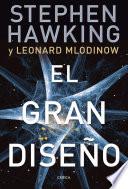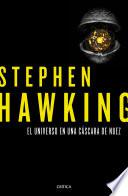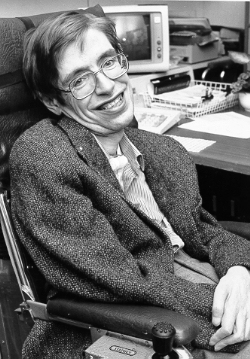Stephen Hawking (nacido en 1942), físico inglés. Der Spiegel, 1989
Fuente: Citado en: 10000 Days: The rest of your life, the best of your life. Tom Hinton. The 10000 days Foundation. ISBN 0-9835032-0-6. ISBN 0-9835032-0-6. Pág. 70
Obras

Brevísima historia del tiempo
Stephen Hawking
El gran diseño
Stephen Hawking
El universo en una cáscara de nuez
Stephen HawkingBreve historia del tiempo
Stephen HawkingFrases célebres de Stephen Hawking
Este pequeño discurso fue usado también por Hawkings en la inauguración de la décima edición de la Campus Party. Hawkings fue invitado por la organización a la tradicional encendida de ordenadores, aunque su presencia fue telemática.
Entrevista del diario The Guardian (15/05/2011)
Frases sobre el espacio. de Stephen Hawking
El gran diseño 2010
The Grand Design
A Briefer History of Time
Frases de Dios de Stephen Hawking
“Dios no solo juega a los dados, a veces los tira donde no se pueden ver.”
A Briefer History of Time
Stephen Hawking Frases y Citas
Discover, February 1987, p. 70.
A Briefer History of Time
“Cuando miramos al universo, lo vemos tal como fue en el pasado”
A Brief History of Time
“La ciencia podría afirmar que el universo tenía que haber conocido un comienzo.”
Agujeros negros y pequeños universos (y otros ensayos), editado en 1993.
Se refiere a que según él, Juan Pablo II le pidió que no estudiara el origen del universo, puesto que sólo compete a Dios.
The New York Times Magazine, “The Universe and Dr. Hawking”, por Michael Harwood, 23 de enero de 1983, p. 53. [Sin fuentes]
“"Cada vez que escucho hablar de ese gato, empiezo a sacar mi pistola".”
Acerca de la Paradoja de Schrödinger
A Briefer History of Time
Entrevista del diario El Mundo (26/10/2014)
Stephen Hawking: Frases en inglés
“Life would be tragic if it weren't funny.”
As quoted in "The Science of Second-Guessing", The New York Times (12 December 2004)
Variante: Remember to look up at the stars and not down at your feet. Never give up work. Work gives you meaning and purpose and life is empty without it. If you are lucky enough to find love, remember it is there and don't throw it away.
“If time travel is possible, where are the tourists from the future?”
Fuente: A Brief History of Time
“It matters if you don't just give up.”
Attributed in Going Within (1990) http://books.google.com/books?id=buVs1VVUZakC&lpg=PP1&pg=PA303#v=onepage&q&f=false by Shirley MacLaine, p. 303
Attributed
British Telecom advertisement (1993), part of which was used in Pink Floyd's Keep Talking (1994) and Talkin' Hawkin'<nowiki/> (2014)
Contexto: For millions of years, mankind lived just like the animals. Then something happened which unleashed the power of our imagination. We learned to talk and we learned to listen. Speech has allowed the communication of ideas, enabling human beings to work together to build the impossible. Mankind's greatest achievements have come about by talking, and its greatest failures by not talking. It doesn't have to be like this. Our greatest hopes could become reality in the future. With the technology at our disposal, the possibilities are unbounded. All we need to do is make sure we keep talking.
On voluntary euthanasia as quoted in People's Daily Online (14 June 2006) http://english.people.com.cn/200606/14/eng20060614_273839.html
Speech at Macworld Expo in Boston, as quoted in The Daily News (4 August 1994) http://news.google.com/newspapers?id=bD8PAAAAIBAJ&sjid=IoYDAAAAIBAJ&pg=4837%2C5338590. A nearly identical quote can be found at the end of the second paragraph of his lecture Life in the Universe http://hawking.org.uk/index.php?option=com_content&view=article&id=65 (1996).
“I have no idea. People who boast about their IQ are losers.”
Response upon being questioned as to his IQ, in interview with Deborah Solomon "The Science of Second-Guessing", The New York Times (12 December 2004)
Fuente: A Brief History of Time (1988), Ch. 12
Contexto: Even if there is only one possible unified theory, it is just a set of rules and equations. What is it that breathes fire into the equations and makes a universe for them to describe? The usual approach of science of constructing a mathematical model cannot answer the questions of why there should be a universe for the model to describe. Why does the universe go to all the bother of existing?
Fuente: A Brief History of Time (1988), Ch. 1
Contexto: Any physical theory is always provisional, in the sense that it is only a hypothesis: you can never prove it. No matter how many times the results of experiments agree with some theory, you can never be sure that the next time the result will not contradict the theory. On the other hand, you can disprove a theory by finding even a single observation that disagrees with the predictions of the theory. As philosopher of science Karl Popper has emphasized, a good theory is characterized by the fact that it makes a number of predictions that could in principle be disproved or falsified by observation. Each time new experiments are observed to agree with the predictions the theory survives, and our confidence in it is increased; but if ever a new observation is found to disagree, we have to abandon or modify the theory.
British Telecom advertisement (1993), part of which was used in Pink Floyd's Keep Talking (1994) and Talkin' Hawkin'<nowiki/> (2014)
Contexto: For millions of years, mankind lived just like the animals. Then something happened which unleashed the power of our imagination. We learned to talk and we learned to listen. Speech has allowed the communication of ideas, enabling human beings to work together to build the impossible. Mankind's greatest achievements have come about by talking, and its greatest failures by not talking. It doesn't have to be like this. Our greatest hopes could become reality in the future. With the technology at our disposal, the possibilities are unbounded. All we need to do is make sure we keep talking.
“So what is real and what is imaginary? Is the distinction just in our minds?”
The Universe in a Nutshell (2001), p. 59
Contexto: One might think this means that imaginary numbers are just a mathematical game having nothing to do with the real world. From the viewpoint of positivist philosophy, however, one cannot determine what is real. All one can do is find which mathematical models describe the universe we live in. It turns out that a mathematical model involving imaginary time predicts not only effects we have already observed but also effects we have not been able to measure yet nevertheless believe in for other reasons. So what is real and what is imaginary? Is the distinction just in our minds?
Fuente: Black Holes and Baby Universes and Other Essays (1993), pp. 133–135.
Contexto: The ultimate objective test of free will would seem to be: Can one predict the behavior of the organism? If one can, then it clearly doesn't have free will but is predetermined. On the other hand, if one cannot predict the behavior, one could take that as an operational definition that the organism has free will … The real reason why we cannot predict human behavior is that it is just too difficult. We already know the basic physical laws that govern the activity of the brain, and they are comparatively simple. But it is just too hard to solve the equations when there are more than a few particles involved … So although we know the fundamental equations that govern the brain, we are quite unable to use them to predict human behavior. This situation arises in science whenever we deal with the macroscopic system, because the number of particles is always too large for there to be any chance of solving the fundamental equations. What we do instead is use effective theories. These are approximations in which the very large number of particles are replaced by a few quantities. An example is fluid mechanics … I want to suggest that the concept of free will and moral responsibility for our actions are really an effective theory in the sense of fluid mechanics. It may be that everything we do is determined by some grand unified theory. If that theory has determined that we shall die by hanging, then we shall not drown. But you would have to be awfully sure that you were destined for the gallows to put to sea in a small boat during a storm. I have noticed that even people who claim everything is predetermined and that we can do nothing to change it, look before they cross the road. … One cannot base one's conduct on the idea that everything is determined, because one does not know what has been determined. Instead, one has to adopt the effective theory that one has free will and that one is responsible for one's actions. This theory is not very good at predicting human behavior, but we adopt it because there is no chance of solving the equations arising from the fundamental laws. There is also a Darwinian reason that we believe in free will: A society in which the individual feels responsible for his or her actions is more likely to work together and survive to spread its values.
As quoted in Stephen Hawking's Universe http://books.google.com/books?id=lkntNIwunAAC&pg=PA77&dq=hawking+%22my+goal+is+simple%22&ei=q5HtSvCOIoLklQTU_cWhDA#v=onepage&q=hawking%20%22my%20goal%20is%20simple%22&f=false (1985) by John Boslough, Ch. 7 : The Final Question, p. 77
